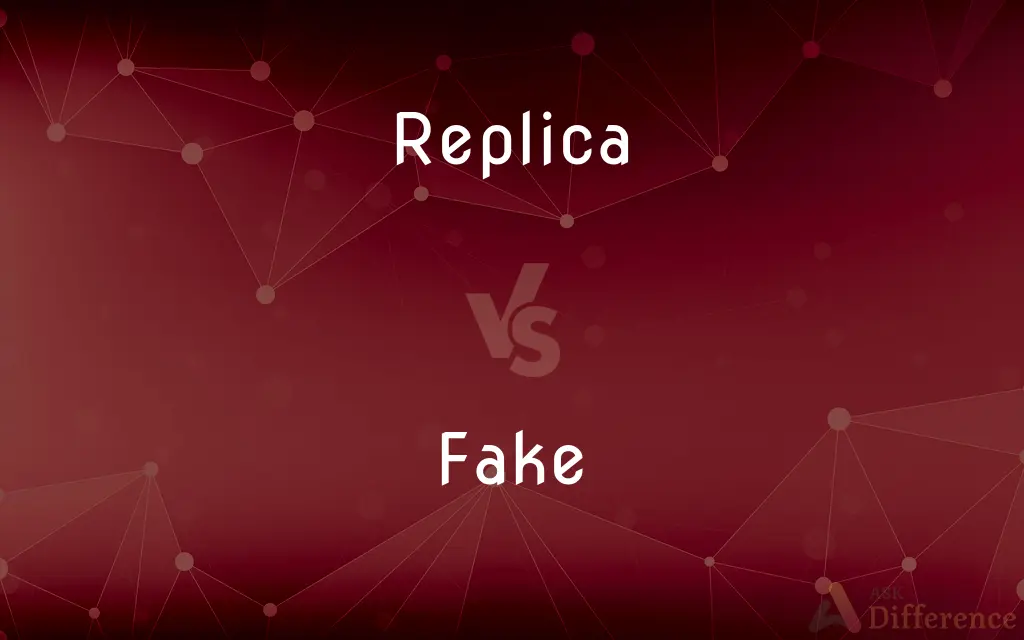Replica vs. Fake — What's the Difference?
By Maham Liaqat & Fiza Rafique — Updated on April 15, 2024
Replica products mimic original designs with varying degrees of quality, whereas fake items are unauthorized copies intended to deceive.

Difference Between Replica and Fake
Table of Contents
ADVERTISEMENT
Key Differences
Replicas are often created with the intent to offer a more affordable version of a high-demand item, maintaining some level of quality and adherence to the appearance of the original. Whereas, fake products are typically produced illegally and aim to pass off as the genuine article, often using inferior materials and craftsmanship.
Many replicas are sold openly under the understanding that they are not authentic but are instead tribute pieces, like replica vintage cars or designer bags. On the other hand, fake items are sold in a manner that tries to mislead the consumer into thinking they are purchasing an authentic product, which can infringe on trademarks and deceive consumers.
In some industries, such as art and fashion, replicas can be respected for their craftsmanship and legality if they do not claim to be the original. However, fake products are generally regarded negatively because they can undermine the brand value and reputation of the companies being imitated.
The legality of replicas can vary depending on how they are marketed and the specific laws governing copyright and trademark in a region. Meanwhile, selling fake goods is widely illegal and can lead to severe penalties including fines and imprisonment.
Consumers may opt for replicas when looking for a less expensive version of a hard-to-obtain or costly item, appreciating the resemblance to the original without the steep price. Conversely, those deceived by fake products often experience disappointment and financial loss, as these items are less likely to perform as expected.
ADVERTISEMENT
Comparison Chart
Intent
To offer an affordable homage
To deceive consumers
Legality
Legal, depending on context
Typically illegal
Quality
Often decent
Usually inferior
Consumer Awareness
Buyers are aware they are not original
Buyers are misled about authenticity
Market Perception
Sometimes positive
Generally negative
Compare with Definitions
Replica
Products made to imitate the style of another without claiming authenticity.
The shop sells replica designer bags at a lower price.
Fake
An item made to look like something it is not, especially for fraudulent purposes.
He unknowingly bought a fake watch.
Replica
A reproduction of an artifact or a piece of art, often used in museums for display.
The museum displayed a replica of the ancient vase.
Fake
An unauthorized copy that violates intellectual property rights.
They found fake software CDs in the market.
Replica
Legally produced products that resemble others but do not claim to be the original.
The company sells replica vintage furniture.
Fake
Goods produced with the intention of deception.
The fake tickets to the concert were sold online.
Replica
An item resembling another in a way that is not original but is not intended to deceive.
He drives a replica of a 1920s sports car.
Fake
A counterfeit product designed to deceive consumers.
The street vendor was caught selling fake brand-name sunglasses.
Replica
A copy or reproduction of a product.
She bought a replica of an 18th-century painting.
Fake
A product replicating an original with the intent to sell as genuine.
She was upset to learn her necklace was fake.
Replica
A replica is an exact copy, such as of a painting, as it was executed by the original artist or a copy or reproduction, especially one on a scale smaller than the original.A replica is a copying closely resembling the original concerning its shape and appearance. An inverted replica complements the original by filling its gaps.
Fake
Not genuine; imitation or counterfeit
She got on the plane with a fake passport
A fake Cockney accent
Replica
A copy or reproduction of a work of art, especially one made by the original artist.
Fake
A thing that is not genuine; a forgery or sham
Fakes of Old Masters
Replica
A copy or reproduction, especially one on a scale smaller than the original.
Fake
Variant spelling of flake
Replica
An exact copy.
The statue on the museum floor is an authentic replica.
Fake
Forge or counterfeit (something)
She faked her spouse's signature
Replica
A copy made at a smaller scale than the original.
He collected replicas of old cars.
Fake
Variant spelling of flake
Replica
A copy of a work of art, as of a picture or statue, made by the maker of the original.
Fake
Having a false or misleading appearance; fraudulent.
Replica
Repetition.
Fake
One that is not authentic or genuine; a sham.
Replica
Copy that is not the original; something that has been copied
Fake
(Sports) A brief feint or aborted change of direction intended to mislead one's opponent or the opposing team.
Fake
One loop or winding of a coiled rope or cable.
Fake
To contrive and present as genuine; counterfeit
Fake a signature.
Fake
To simulate; feign
Faked his death so his wife would collect insurance money.
Fake
(Music) To improvise (a passage).
Fake
(Sports) To deceive (an opponent) with a fake. Often used with out.
Fake
To engage in feigning, simulation, or other deceptive activity.
Fake
(Sports) To perform a fake.
Fake
To coil (a rope or cable).
Fake
Not real; false, fraudulent
Which fur coat looks fake?
Fake
(of people) Insincere
Fake
Something which is not genuine, or is presented fraudulently.
I suspect this passport is a fake.
Fake
(sports) A move meant to deceive an opposing player, used for gaining advantage for example when dribbling an opponent.
Fake
(archaic) A trick; a swindle
Fake
(nautical) One of the circles or windings of a cable or hawser, as it lies in a coil; a single turn or coil.
Fake
(transitive) To make a counterfeit, to counterfeit, to forge, to falsify.
Fake
(transitive) To make a false display of, to affect, to feign, to simulate.
To fake a marriage
To fake happiness
To fake a smile
Fake
(archaic) To cheat; to swindle; to steal; to rob.
Fake
(archaic) To modify fraudulently, so as to make an object appear better or other than it really is
Fake
To improvise, in jazz.
Fake
(nautical) To coil (a rope, line, or hawser), by winding alternately in opposite directions, in layers usually of zigzag or figure of eight form, to prevent twisting when running out.
Fake
One of the circles or windings of a cable or hawser, as it lies in a coil; a single turn or coil.
Fake
A trick; a swindle.
Fake
To coil (a rope, line, or hawser), by winding alternately in opposite directions, in layers usually of zigzag or figure of eight form,, to prevent twisting when running out.
Fake
To cheat; to swindle; to steal; to rob.
Fake
To make; to construct; to do.
Fake
To manipulate fraudulently, so as to make an object appear better or other than it really is; as, to fake a bulldog, by burning his upper lip and thus artificially shortening it.
Fake
Something that is a counterfeit; not what it seems to be
Fake
A person who makes deceitful pretenses
Fake
(football) a deceptive move made by a football player
Fake
Make a copy of with the intent to deceive;
He faked the signature
They counterfeited dollar bills
She forged a Green Card
Fake
Fake or falsify;
Fudge the figures
Cook the books
Falsify the data
Fake
Talk through one's hat;
The politician was not well prepared for the debate and faked it
Fake
Fraudulent; having a misleading appearance
Fake
Not genuine or real; being an imitation of the genuine article;
It isn't fake anything; it's real synthetic fur
Faux pearls
False teeth
Decorated with imitation palm leaves
A purse of simulated alligator hide
Common Curiosities
What is a fake product?
A fake product is an unauthorized copy made to deceive someone into believing it is genuine.
Are replicas legal?
Replicas can be legal, provided they do not violate copyright or trademark laws and are sold as tributes, not as authentic originals.
Why do people buy replicas?
People buy replicas to enjoy the design or functionality of a product without the high cost associated with the original.
Can fake products be harmful?
Yes, fake products can be harmful, especially electronics or pharmaceuticals, as they may not meet safety standards.
How can I identify a fake product?
Fakes can often be identified by poor craftsmanship, errors in branding, and suspiciously low prices.
Can I legally buy a replica?
Yes, buying a replica is legal if the item is marketed as a replica and not as an authentic original.
What is a replica?
A replica is a copy or reproduction, often created with the intent to offer a similar item more affordably without deceiving about its authenticity.
Do replicas have any value?
Yes, replicas can have considerable value, especially if they are well-made and respect the original design without pretending to be the real thing.
Is it illegal to sell fake products?
Yes, selling fake products is illegal and can lead to fines and imprisonment.
How does the quality of replicas compare to originals?
While replicas can vary, they generally offer a decent quality that respects the original design but at a lower cost.
Are all replicas considered fakes?
No, replicas are not necessarily fakes if they do not attempt to deceive consumers about their authenticity.
Why are fake items considered unethical?
Fakes are considered unethical because they deceive consumers and infringe on intellectual property rights.
How are fake goods distributed?
Fake goods are often distributed through informal markets, online platforms, or illicit stores that aim to deceive consumers.
What are common examples of fake items?
Common examples include counterfeit clothing, accessories, electronics, and medications.
What should I do if I find a fake product?
Report the item to the authorities or the original brand to help prevent further fraud.
Share Your Discovery

Previous Comparison
Maternal vs. Paternal
Next Comparison
Logarithmic vs. ExponentialAuthor Spotlight
Written by
Maham LiaqatCo-written by
Fiza RafiqueFiza Rafique is a skilled content writer at AskDifference.com, where she meticulously refines and enhances written pieces. Drawing from her vast editorial expertise, Fiza ensures clarity, accuracy, and precision in every article. Passionate about language, she continually seeks to elevate the quality of content for readers worldwide.
















































